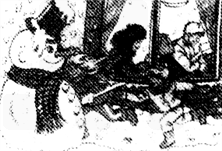摘要: James committed the offence the influence of the drug.
网址:http://m.1010jiajiao.com/timu3_id_3236247[举报]
阅读理解。
It is winter and it is snowing. It usually snows in January here. Betty and James are playing in the
garden. They make a snowman and throw snowballs. They like snow very much! Their snowman
and throw snowballs. They like snow very much! Their parents don't like it. They always stay in the
house when it is snowing. Mother usually watches TV and father listens to the radio or reads a book.
Now they are sitting in the living room. Mother is writing a letter and father is reading a book.

garden. They make a snowman and throw snowballs. They like snow very much! Their snowman
and throw snowballs. They like snow very much! Their parents don't like it. They always stay in the
house when it is snowing. Mother usually watches TV and father listens to the radio or reads a book.
Now they are sitting in the living room. Mother is writing a letter and father is reading a book.

根据短文内容,回答问题。
1. When does it usually snow?
2. Who likes snow?
3. What does mother usually do when it snows?
4. Where are Mother and Father now?
5. What's Father doing?
查看习题详情和答案>>
1. When does it usually snow?
2. Who likes snow?
3. What does mother usually do when it snows?
4. Where are Mother and Father now?
5. What's Father doing?
阅读短文,选择正确的答案。
Most English people have three names: a first name, a middle name and the family name. Their family name
comes last. For example, my full name is Jim Allen Green. Green is my family name. My parents gave me both
of my other names.
People don't use their middle names very much. So "John Henry Brown" is usually called "John Brown".
People never use Mr., Mrs. or Miss before their first names. So you can say John Brown, or Mr. Brown, but
you should never say Mr. John. They use Mr., Mrs. or Miss with the family name but never with the first name.
Sometimes people ask me about my name. "When you were born, why did your parents call you Jim?" they
ask. "Why did they choose that name?" The answer is they didn't call me Jim. They called me James. James was
the name of my grandfather. In England, people usually call me Jim for short. That's because it is shorter and
easier than James.
comes last. For example, my full name is Jim Allen Green. Green is my family name. My parents gave me both
of my other names.
People don't use their middle names very much. So "John Henry Brown" is usually called "John Brown".
People never use Mr., Mrs. or Miss before their first names. So you can say John Brown, or Mr. Brown, but
you should never say Mr. John. They use Mr., Mrs. or Miss with the family name but never with the first name.
Sometimes people ask me about my name. "When you were born, why did your parents call you Jim?" they
ask. "Why did they choose that name?" The answer is they didn't call me Jim. They called me James. James was
the name of my grandfather. In England, people usually call me Jim for short. That's because it is shorter and
easier than James.
1. Most English people have names.
[ ]
A. one
B. two
C. three
D. four
B. two
C. three
D. four
2. The family name comes .
[ ]
A. first
B. the first
C. last
D. No. 1
B. the first
C. last
D. No. 1
3. is Jim's family name.
[ ]
A. Jim
B. Green
C. Allen
D. James
B. Green
C. Allen
D. James
4. English people use Mr., Mrs. or Miss with .
[ ]
A. the family name
B. the first name
C. the middle name
D. the first name and the middle name
B. the first name
C. the middle name
D. the first name and the middle name
5. The teacher's name is Mary Joan Shute. Her students call her .
[ ]
A. Miss Mary
B. Miss Joan
C. Miss Mary Joan
D. Miss Shute
查看习题详情和答案>>
B. Miss Joan
C. Miss Mary Joan
D. Miss Shute
| Read and fill in the blanks.阅读短文,根据上下文选择合适的词。 |
| James is ten years old. He is a good 1 . He 2 hard at school and works hard 3 home, 4 . One 5 his mother was 6 the clothes. She said, "James, 7 you like to clean the house ?" "Sure, mum. I'd like to." James said. He took out the broom and swept the floor carefully. 8 a while, the floor was very 9 . Though he was tired, he was 10 to help his mother. |
| ( )1. A.boy ( )2. A.work ( )3. A. at ( )4. A. to ( )5. A. minute ( )6. A. washed ( )7. A. would ( )8. A. Before ( )9. A. dirty ( )10. A. happy |
B. girl B. works B. in B. too B. hour B. wash B. did B. After B. tidy B. sad |
C. woman C. worked C. on C. either C. day C. washing C. do C. In C. healthy C. angry |